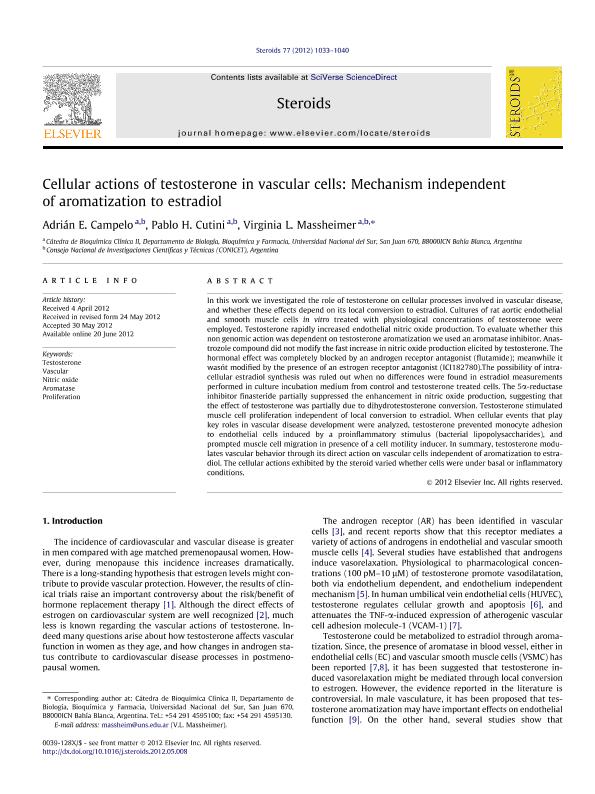Mostrar el registro sencillo del ítem
dc.contributor.author
Campelo, Adrián Esteban

dc.contributor.author
Cutini, Pablo Hernan

dc.contributor.author
Massheimer, Virginia Laura

dc.date.available
2018-09-21T20:02:31Z
dc.date.issued
2012-09
dc.identifier.citation
Campelo, Adrián Esteban; Cutini, Pablo Hernan; Massheimer, Virginia Laura; Cellular actions of testosterone in vascular cells: mechanism independent of aromatization to estradiol; Elsevier Science Inc; Steroids; 77; 11; 9-2012; 1033-1040
dc.identifier.issn
0039-128X
dc.identifier.uri
http://hdl.handle.net/11336/60656
dc.description.abstract
In this work we investigated the role of testosterone on cellular processes involved in vascular disease, and whether these effects depend on its local conversion to estradiol. Cultures of rat aortic endothelial and smooth muscle cells in vitro treated with physiological concentrations of testosterone were employed. Testosterone rapidly increased endothelial nitric oxide production. To evaluate whether this non genomic action was dependent on testosterone aromatization we used an aromatase inhibitor. Anastrozole compound did not modify the fast increase in nitric oxide production elicited by testosterone. The hormonal effect was completely blocked by an androgen receptor antagonist (flutamide); meanwhile it wasńt modified by the presence of an estrogen receptor antagonist (ICI182780).The possibility of intracellular estradiol synthesis was ruled out when no differences were found in estradiol measurements performed in culture incubation medium from control and testosterone treated cells. The 5α-reductase inhibitor finasteride partially suppressed the enhancement in nitric oxide production, suggesting that the effect of testosterone was partially due to dihydrotestosterone conversion. Testosterone stimulated muscle cell proliferation independent of local conversion to estradiol. When cellular events that play key roles in vascular disease development were analyzed, testosterone prevented monocyte adhesion to endothelial cells induced by a proinflammatory stimulus (bacterial lipopolysaccharides), and prompted muscle cell migration in presence of a cell motility inducer. In summary, testosterone modulates vascular behavior through its direct action on vascular cells independent of aromatization to estradiol. The cellular actions exhibited by the steroid varied whether cells were under basal or inflammatory conditions.
dc.format
application/pdf
dc.language.iso
eng
dc.publisher
Elsevier Science Inc

dc.rights
info:eu-repo/semantics/openAccess
dc.rights.uri
https://creativecommons.org/licenses/by-nc-sa/2.5/ar/
dc.subject
Aromatase
dc.subject
Nitric Oxide
dc.subject
Proliferation
dc.subject
Testosterone
dc.subject
Vascular
dc.subject.classification
Otras Ciencias Biológicas

dc.subject.classification
Ciencias Biológicas

dc.subject.classification
CIENCIAS NATURALES Y EXACTAS

dc.title
Cellular actions of testosterone in vascular cells: mechanism independent of aromatization to estradiol
dc.type
info:eu-repo/semantics/article
dc.type
info:ar-repo/semantics/artículo
dc.type
info:eu-repo/semantics/publishedVersion
dc.date.updated
2018-09-11T18:13:03Z
dc.journal.volume
77
dc.journal.number
11
dc.journal.pagination
1033-1040
dc.journal.pais
Estados Unidos

dc.journal.ciudad
Nueva York
dc.description.fil
Fil: Campelo, Adrián Esteban. Consejo Nacional de Investigaciones Científicas y Técnicas. Centro Científico Tecnológico Conicet - Bahía Blanca; Argentina. Universidad Nacional del Sur. Departamento de Biología, Bioquímica y Farmacia; Argentina
dc.description.fil
Fil: Cutini, Pablo Hernan. Consejo Nacional de Investigaciones Científicas y Técnicas. Centro Científico Tecnológico Conicet - Bahía Blanca; Argentina. Universidad Nacional del Sur. Departamento de Biología, Bioquímica y Farmacia; Argentina
dc.description.fil
Fil: Massheimer, Virginia Laura. Consejo Nacional de Investigaciones Científicas y Técnicas. Centro Científico Tecnológico Conicet - Bahía Blanca; Argentina. Universidad Nacional del Sur. Departamento de Biología, Bioquímica y Farmacia; Argentina
dc.journal.title
Steroids

dc.relation.alternativeid
info:eu-repo/semantics/altIdentifier/doi/http://dx.doi.org/10.1016/j.steroids.2012.05.008
dc.relation.alternativeid
info:eu-repo/semantics/altIdentifier/url/https://www.sciencedirect.com/science/article/pii/S0039128X12001821
Archivos asociados
